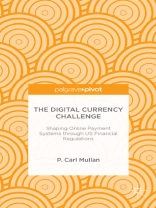Private online digital currency systems offer people accessible, convenient, and inexpensive everyday financial tools outside of traditional bank-owned and operated platforms. Digital currency systems facilitate local and international fund transfers, online and offline payments, and simple cash-to-digital everyday financial products without the need for a conventional bank account of any retail bank product. Over the past several years, Bitcoin has grown into an efficient person-to-person and person-to-business payment system without the backing of any bank or financial institution. This phenomenon is producing a new level of an on- and offline commerce and a society much more attuned to digital currency systems. The Digital Currency Challenge details how new 2007-2008 U.S. legal issues surrounding digital currency products forced companies from the U.S. market and caused the Treasury Department to enact stricter regulations. Mullan profiles new and innovative present day digital currency systems, such as Bitcoin, and illustrates how software designers and monetary theorists use new technology to circumvent current U.S. regulations. This work also explains how new digital currency systems are not just software products, but tools providing financial freedom to people in countries all around the world.
Inhaltsverzeichnis
Introduction 1. What Is Digital Currency? 2. Who Uses Digital Currency? 3. Digital Gold Currency 4. E-gold 5. Digital Currency Growth 6. Regulatory History 7. Follow the Money 8. Money Service Business 9. Prepaid Access 10. Web Money Transfer 11. Loom 12. Bitcoin Decentralized Virtual Currency 13. Early Bitcoin 14. Bitcoin Mining 15. Bitcoin Differences 16. Benefits and Advantages 17. Disadvantages and Barriers 18. FIN-2013-G001 19. Global Bitcoin 20. Bitcoin Challenges 21. Bitcoin Merchant Services 22. Bitcoin Opportunity 23. The Future
Über den Autor
P. Carl Mullan is President and CEO at PDX Currency Corporation, USA.












